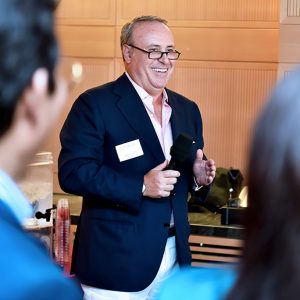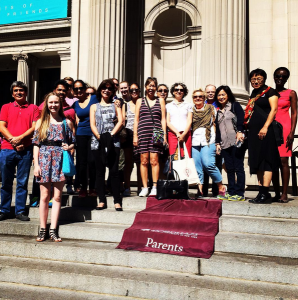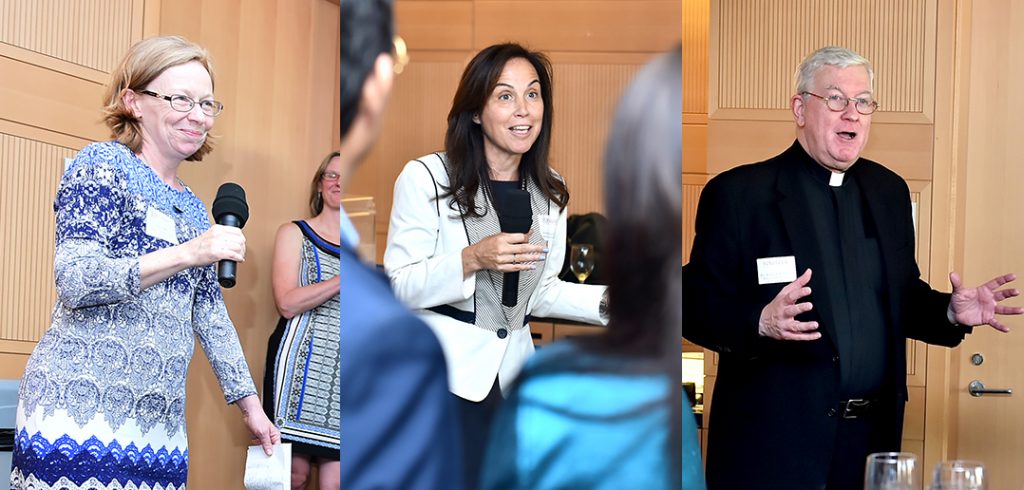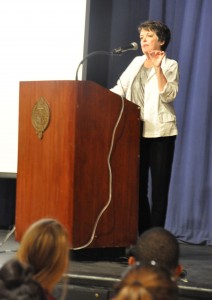Students, alumni, and extended members of the Ram family will get a chance to showcase their Fordham pride at Fordham’s Second Annual Giving Day.
The fundraising event, to be held on March 6 through March 7 from 12 noon EST to 12 noon EST, supports Fordham’s schools and programs with an emphasis on Faith & Hope: The Campaign for Financial Aid.
In 2017, the University surpassed its goal of engaging 1,750 donors during its inaugural event, raising $786, 271 from 2,101 Fordham donors. This year, Fordham hopes to engage 2,500 donors in a 24-hour period.
“Last year was our first-ever Fordham Giving Day and it was super successful,” said Elaine Ezrapour, assistant director of the Fordham Fund. “We hope to bring more awareness and excitement to this year’s Giving Day. ”
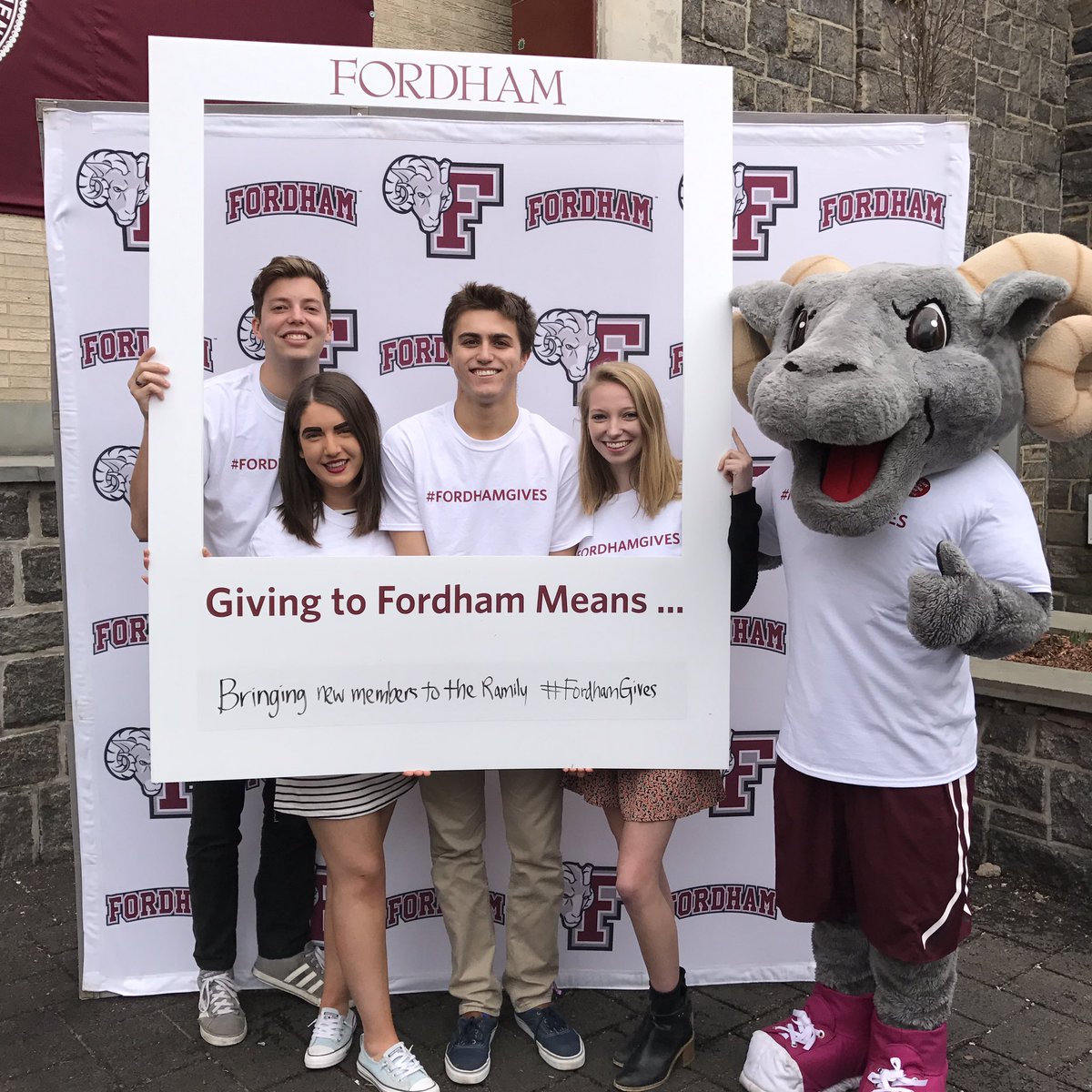
Alumni, friends, students, and faculty will gather together in support of Fordham Giving Day at a reception held at the Lincoln Center campus on March 6 from 6:30 – 8:30 p.m. and 5 – 8 p.m. at the Westchester campus.
Ezrapour said there will be day-long and hourly Giving Day challenges across social media platforms as well as on Fordham’s Rose Hill, Lincoln Center, and Westchester campuses. Fordham enthusiasts are invited to contribute gifts of all amounts to their favorite Fordham causes, from the Fordham Fund and Fordham Athletics to WFUV and Fordham Law.
“We’re gathering people around the world in a celebration of Fordham,” said Ezrapour. “If people aren’t able to give, they can still be involved in amplifying the generosity of others.”
Fordham College at Lincoln Center junior Daniel Nasta, a member of the Student Philanthropy Committee, agreed.
“This year, we have a variety of quirky social media challenges and it’s going to be really fun to watch people engage with them,” he said.
Some of the 2018 Giving Day challenges include:
- Big Giving Day Challenge: If 1,000 people give on Giving Day, a generous donor will contribute $50,000 to support scholarships and financial aid.
- Reunion Classes Challenge: If 100 gifts are made from alumni celebrating a reunion year this year (all class years ending in 3 and 8), a $2,500 gift will be unlocked.
- Fordham Swag Challenge from noon to 3 p.m.: Ramses will pick his favorite selfie posted by a supporter in Fordham gear, and $1,000 will be given to Fordham in the poster’s honor.
- Parent Challenge: All gifts made by Fordham parents will be matched, dollar for dollar, up to $10,000.
- Professor Shout-Out Challenge from 9 a.m. to 12 p.m.: Supporters who post about a Fordham professor who changed their lives will have a chance to have $1,000 donated to Fordham in honor of the donor and the professor.
- International Ram Challenge from midnight to 6 a.m.: Rams living or studying abroad who post a selfie that is representative of their current country will have a chance to have $1,000 donated to Fordham in their honor.
Sabrina Sabio, a senior at the Gabelli School, said every effort on Giving Day has the potential to create a ripple effect.
“From supporting our Fordham Fund to donating to a specific school, there’s always a place to contribute to,” said Sabio, who served as a student ambassador at the 2017 Giving Day on behalf of the Student Philanthropy Committee. “Even the smallest donation can help unlock larger challenges that ultimately benefit the community as a whole.”
]]>The panelists, all members of the Fordham’s Parents’ Leadership Council, spent the evening reflecting on both the state of their own industries, and their personal career trajectories. A group discussion in the Keating First auditorium attended by 140 students was followed by breakout sessions in classrooms that featured non only the parents, but also employees of their respective firms who could also answer questions.
The evening featured:
-Richard Cervini, PAR ’19, Senior Vice President of Production and Technical Operations, CBS Television Distribution;
-Jeffrey Cusack, PAR ’19, Senior Managing Director, National Sales Manager, Nuveen Investment LLC;
-Marc Landanyi, M.D., PAR ’18, Chief of Molecular Diagnostics Service, MSKCC;
-Donna Morris, PAR ’19, Executive Vice President, Customer and Employee Experience, Adobe;
-Philip Rielly, PAR ’20, Vice President, President of Diplomat Specialty Infusion Group; and
Jean Wynn, Marymount ’80, PAR ’20, Managing Director and Head of Corporate Banking & Public Finance, The Bank of New York Mellon Corp.
Listen to the discussion:
A common theme for the parents, most of whom offer formal summer internships to students, was hiring. Morris suggested that graduates focus less on their resumes and more on their networks, particularly those they build and maintain on LinkedIn. Maintaining a robust digital presence is key, she said, to creating their own brand, irrespective of whether they’re an introvert or an extrovert.
Cusack noted that he’d landed nearly every job he had through a contact. But even then, he cautioned, you should go into an interview prepared to do more than just answer questions.
“For me, the interview doesn’t start until you ask me questions about my company,” he said. “I don’t even care if you’ve got information wrong; I just want to see you’re taking the initiative.”
Dr. Landanyi’s advice for succeeding in STEM fields was to seek out colleagues who are smarter than you. “Be aware of what you don’t know, and always challenge yourself to discuss topics that others know more about than you,” he said. “If you’re the smartest one in the room, find another room.”
Wynn said the financial sector is undergoing exciting changes due to increased digitization and an embrace of what she called a Silicon Valley kind of mindset. The Bank of New York Mellon Corp dates back to Alexander Hamilton, but is working with emerging technologies such as Blockchain.
“It’s quite challenging for institutions that are old and established to change their culture, but that can lead to a tremendous amount of opportunity for young people to come in and be a part of that change,” she said.
Rielly extolled the virtues of a liberal arts education, and suggested that would-be entrepreneurs need not know exactly what they want to do upon graduation. Find a company that you’re interested in, and really get to know the industry it occupies, he said. That way, you figure out how to build a better mouse trap, so to speak.
“Be a big sponge. Soak up everything you can,” he said.
Dr. Landanyi concurred, noting, “It’s never too late for STEM.”
For Morris, the panel was both a recruiting tool and an opportunity to share knowledge. Since she started attending in 2015, six Fordham students have interned at Adobe, and this year, Vanessa Gutierrez, a Fordham College at Rose Hill senior, became the first student to accept a full-time position there as a software developer for the firm’s creative apps team.
Gutierrez, a computer science major from Los Angeles, attended the panel two years ago. Although she’d only declared her major a few weeks before, she said Morris’ presentation intrigued her, and she made a conscious effort to be the last one to talk to her so Morris would remember her.
“It’s funny, because in my computer science class that semester there was a guy who sat next to me, and I would often answer questions he had,” she said.
“I was waiting to talk to Donna, and the guy was there also, sitting in the back. I said ‘Oh, are you waiting to talk to her too?’ He said ‘No, that’s my mom.’”
Gutierrez was actually in San Jose interviewing for the position during this year’s panel presentation; she starts in July.
“Events like this are great for getting our name out, particularly for students who want to come back to the West coast,” said Morris, adding that, at recruiting events, tech firms aren’t as well represented as finance and consulting firms.
“If they go to East coast for school, there’s a concern about coming home, because a lot of West coast jobs and internships end up going to students attending West coast schools.”
[doptg id=”96″] ]]>
“What I found, at least through my eyes and my kids’ experiences, was that Fordham lived its mission to a great degree, and that really impressed me,” said Rick, who, along with Marie, serves on the Parents’ Leadership Council (PLC). “When I saw how Fordham supports students in different ways, I was inspired to help.”
Now, parents are having a direct impact on student experiences through the Fordham Parents Fund, which helps to provide financial support for career and student health services.
Since the fund was recast at the beginning of FY 16, parents have given more than $325,000 to the Fordham Parents Fund to help enhance various student experiences on campus.
Supporting students
Lucy Annette McLaughlin, interim director of career services, said her department has received contributions from the fund to invest in new technologies that support career-building for students—including Handshake, a job portal technology, and CareerInsights, a research tool. This fall, the department will also use fund support to work on promotional events to engage students in the Fordham Futures’ four-year career development program.
Additionally, the funds will help to provide professional development, and leadership and training opportunities that are in alignment with high-demand skills in today’s workforce, she said.
“There is a constant need to support student and alumni career development, job search methods, and career transitions for life,” said McLaughlin.
“The future of work is constantly changing, and the Parents’ Leadership Council is a valuable partner for us. We are very thankful to have their support.”
The other half of the money raised from the Fordham Parents Fund will support programs and initiatives focused on student services. Recently, the fund helped upgrade technology in 140 West 62nd Street’s G76 multipurpose room on the Lincoln Center campus.
“The original technology in the room is based off a podium in the front of the room,” said Dorothy Wenzel, Ph.D., director of the Office for Student Involvement at Lincoln Center. “This works great for lectures. However, most of the events we hold in the room for clubs are not lecture events.”
With the new renovations, students can connect multiple microphones to host open mics, dance events, game nights, and other student activities.
Among the health programs the funds will sustain are suicide prevention initiatives that were originally developed with a federal grant three years ago. These include “Kognito At-Risk Virtual Gatekeeper Trainings” for students, faculty, and staff; the Stressbusters Mobile App; and Culturally and Linguistically Appropriate Suicide Prevention brochures.
Thanks also to the fund, the Office of Multicultural Affairs will be able to advance its Racial Solidarity Network program, which aims to strengthen race relations at Fordham. The program will officially kick off this year with a session in November, and a second session in February 2018.
“Our job is to create an environment where everyone can feel included,” said Juan Carlos Matos, assistant dean and director of the Office of Multicultural Affairs. “When parents of students who attend Fordham see this initiative as something they want to support, it sends a strong message that it’s not just Fordham that believes it’s important.”
For parents Alida and James Nally, University-parent partnerships are essential for student success.
“We continue to be a part of the PLC to help other parents and students understand the profound impact a Fordham education has in educating the whole person [as]“men and women for others,” said Alida.
]]>The occasion was an Aug. 26 dean’s reception for parents of international students from the Class of 2019. Elsewhere on campus their children were acclimating to their new school through the Global Transitions Program, an extensive orientation geared toward international students.
Donna Rapaccioli, PhD, dean of the Gabelli School of Business, and Maura Mast, PhD, dean ofFordham College at Rose Hill, joined Father Grimes to welcome the parents of the largest international class to date. Rapaccioli, a mother of three, said she was well versed in the college move-in day.
“I remember it was a was a proud moment, but one that was filled with anxiety,” she said. “But Fordham has an ecosystem that will ensure that your child has the support they need.”
For her part, Mast said she could relate to the students, as this was her first public event as the new dean at Rose Hill. She is the first woman to fill the role since the college’s inception in 1841.
“I chose to come to Fordham for many of the same reasons that your children did,” she said, adding that she appreciated Fordham’s emphasis on the undergraduate experience. “Your sons and daughters will broaden their world socially, culturally, academically, and I hope spiritually.”
The event was a new initiative for the Parents’ Leadership Council that offered moms and dads their own orientation to Fordham. Parents went on a tour of Rose Hill, attended the reception, and a later were welcomed at an elegant dinner. The following day, Isabelle Frank, dean of the School of Professional and Continuing Studies, joined Midori Yamamura, PhD, lecturer in art, to lead parents on a tour at the Metropolitan Museum of Art.
“Move-in day is important because we leave our kids to the University,” said Andrea Mennillo, the international chair of the Parents’ Leadership Council. “Fordham is a great community, and families are a part of that.”
Eric and Anna Pichardo, of Tijuana, Mexico, arrived at the reception with bags from a Uniqlo, the Japanese clothing store. Earlier that day they were in Queens at Costco and Target, getting dorm room supplies for their daughter, Erica, a freshman at Fordham College at Lincoln Center.
“She was calling us all day, saying ‘I need this, I forgot this, and I need that,’” Eric said with a laugh.
He said he was calm about his daughter’s transition, being that the parents have been schooling their daughters in California since the girls were in first grade. Anna was a bit more apprehensive. She was worried that Erica might not like the food.
No such problem with incoming freshman Chenyang Fu from Shanghai, China, said her mother Amy Liu.
“She likes the city, she likes the University, and she loves the food,” she said.
Some of the international students toured the campus last winter. But many were encountering it for the first time, as was the case with freshman Jake Chen. His parents, Joanne and Peter Chen, said that he had just finished his national service in Singapore.
“We’ve raised our kids to be as international as possible,” said Peter. “Jake is very capable, so his adjusting is the least of my worries.”
With this year’s crop of new international students hailing from Saudi Arabia to Spain, from Monaco to Mexico, and from Italy to India, the parents exhibited the mix of pride and anxiety that Rapaccioli described.
But the Global Transitions program for parents, which offered them three days to get to know fellow international parents, did offer a measure of calm, said Trygve Kjolseth, who arrived with his son Thomas from Norway.
“When we walked around campus this morning I thought, ‘This is a really good group, we should get together again,’” he said. “Our families seem to have some common denominators, and that gives me a good feeling about the community for the kids.”
]]>
It’s no question that Bette-Ann’s tremendous success and passion for the game was passed down to her daughter – making it more of a family tradition. Dominique has proven herself to be one of the most prolific women’s tennis players at Fordham. She finished her senior year with a perfect 19-0 season record, an outstanding 57-4 career record, and joined her mother in winning the prestigious Hobbs Family Award given to Fordham’s Female Athlete of the Year.
Growing up with your mother as your head coach and constant support system, on and off the court, was not the simplest situation to be in for Dominique. But, as she matured as a top player throughout high school, she knew she wanted to uphold her mother’s legacy and create one of her own. “It was hard having a parent who knew the ins and outs of the sport you’re playing because it was difficult to separate her being my mom and my coach at the same time,” Dominique admitted. However, once she matured and began to understand the game better, she says it got easier once her mom gave her space to grow on her own. Once she was able to do this, Dominique began to take her mother’s advice over others because “in the end, she was the little voice in my head” at all times.
Their mother-daughter relationship expanded to an entirely new level as Dominique ended up leading her mother’s team at The Ursuline School (New Rochelle, NY) to a record-breaking 100-match winning streak. Dominique went on to follow in her mother’s footsteps and continue her tennis career as a fellow Fordham Ram. Through her innate sense of competitiveness, exceptional talent, and her mother’s support and advice constantly running through her head, Dominique has certainly created a legacy of her own at Fordham and beyond. Her and her mother’s athletic achievements at Fordham are unmatched, and they deserve an incredible amount of respects for being Fordham’s first mother-daughter, and parent-child, duo in the Athletic Hall of Fame. With hereditary athletic talent and intelligence like theirs, it will be no surprise to see future generations joining them as well.

Today, Dominique’s love for tennis remains just as prominent in her life, as she, like her mother, has made the transition from player to coach. She has said that she finds herself telling her kids the same advice that her mother had always told her, and even though sometimes she did not want it to, those words have been rooted deep into her brain. Bette-Ann’s lessons about life on and off the court are forever embedded in Dominique’s mind as she hopes she can continue to follow in her mother’s footsteps. With all of the deserved appreciation she has received after being inducted, Dominique feels, “I am lucky that my mom knew how to be a teacher after being a player all of her life, and I’m so proud this has all happened the way that it has.”
]]>These experiences, she said, along with her Fordham education, wouldn’t have been possible without the support of the Robert E. Campbell Scholarship and the Denise Jefferson Memorial Scholarship—two of more than 600 donor-funded scholarships awarded annually to Fordham students.
The Ailey/Fordham B.F.A. in Dance program student and others had a chance to thank their donors in person on April 27 at the University’s annual Scholarship Donors and Recipients Reception, held at The University Club in Manhattan. She was among 300 students and donors who attended this festive gathering that celebrates the spirit of giving and the promise of a Fordham education.
“The financial aid I received has helped turn my dreams into opportunities,” said Ballentine. “If not for the scholarships and the generous donors who make them possible, I simply would not have had these chances to shine.”
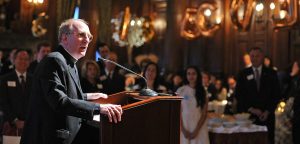 “This is one of the most wonderful nights of the year for Fordham,” said Joseph M. McShane, SJ, president of Fordham, as he compared the celebration to a Thanksgiving holiday. “It’s the only day of the year when all the generations come together to break bread and tell the stories that unite us as families. Tonight is our Thanksgiving. This is the story of the Fordham family.”
“This is one of the most wonderful nights of the year for Fordham,” said Joseph M. McShane, SJ, president of Fordham, as he compared the celebration to a Thanksgiving holiday. “It’s the only day of the year when all the generations come together to break bread and tell the stories that unite us as families. Tonight is our Thanksgiving. This is the story of the Fordham family.”
The lively conversations between donors and students revealed stories of the rewards of hard work and the desire to give back. Students shared experiences made possible by their scholarships, and their plans for the future.
Fordham College at Lincoln Center senior Elizabeth Zanghi met James P. Flaherty, FCRH ’69, and his wife Jane, whose scholarship helped to fund Zanghi’s studies in art history, French, and Orthodox Christian studies. “It has helped so much, especially because I will be going on to graduate school,” said Zanghi, who plans to become a college professor. She is among 19 recipients of two scholarships established by the Flahertys.
Scholarship recipient Amanda Varrone, a Fordham College at Rose Hill junior, said she is thankful for the scholarship that has helped finance her studies in English and Spanish. “I hope to go on to law school,” she said. “And I look forward to continuing learning and growing, not only as a student, but as a person.”
John R. Costantino, GABELLI ’67, LAW ’70, and his wife Barbara chatted with Ferdinand Ruplin, LAW, about everything from his childhood on Long Island to their last trip to Disney World with their grandchildren. “They really are like family,” Ruplin said. The Costantinos have become close to several recipients of the scholarship they established for business students who go to Fordham Law, and in two weeks, will even attend one’s wedding.
The spirit of the evening was captured by Fordham’s Board of Trustees Chair Robert D. Daleo, GABELLI ’72, who grew up in the Bronx and followed his late brother Paul to Fordham, where he received a Uniroyal scholarship that helped fund his education.
“I thought if I ever had the opportunity, I’m going to pay this back,” he said. “I now have the capability and desire to honor my brother with a scholarship in his name and repay Fordham.”
Written by Claire Curry
]]>But Harmer is D.C.-bound on April 22 and 23. The Fordham College at Lincoln Center senior was one of 60 students selected from 500 applicants for the Council of Undergraduate Research’s 19th Annual Posters on the Hill.
As Fordham’s sole representative, he will present his project, “The Likelihood of Greater Economic Integration,” to some 15 members of congress, more than 50 congressional staffers, and representatives from federal funding agencies in Washington, D.C.
The symposium was developed out of an international economics class that he took last fall. Under the mentorship of Shushanik Hakobyan, PhD., assistant professor of economics, Harmer turned a course paper into a finalist project in the Posters on the Hill program.
From the start, Harmer was inspired by Hakobyan’s teaching style, which was rigorous and valuable.
The professor mixed lessons from literature “with the nitty gritty mathematics of economic policy,” Harmer said. “It’s one thing for professors to present an argument to you, but it’s another to back it up with concrete numbers.”
Harmer’s interest gravitated to free trade agreements, and Hakobyan encouraged her students to delve further into their topics.
“I tell them to start very big,” Hakobyan said, “and then identify questions that will make your topic even more specific.”
Hakobyan recommended Harmer take his paper one step further by submitting the project to the council’s program.
“Brandon was interested in free trade agreements, and I thought his topic was solid and promising,” Hakobyan said.
She provided guidance to her mentees as they moved forward in their research.
“Students find out very quickly that research is very time consuming. You need to be hardworking and persistent because there are so many details to take care of,” Hakobyan said.
Harmer’s project focuses on the probability of trading partners moving toward greater steps of economic integration.
He collated specific economic data from all the countries in the world and analyzed the relationships among certain groups.
“We looked at information such as gross domestic product, and the distance between two countries,” Harmer said.
At his professor’s suggestion, he also delved deeper into other factors, such as contiguous borders—countries that share a border—and whether or not a country was a former colony of its trading partner.
Since Harmer covered all the countries in the world, his data was both comprehensive and massive.
“I think I might have actually broken Excel,” Harmer said. “I didn’t think it possible, but there weren’t enough cells to cover the data.” He had to divide the information out over four spreadsheets.
Harmer hopes that his dataset will someday be used as a resource for other economic research.
“My project isn’t here to argue anything specifically,” Harmer said. “It is to present facts, and it’s up to the policymakers to interpret the data and decide what they want to do with it.”
Harmer has participated in campaign work in the past for several assemblymen, but this will be his first time meeting legislators in this capacity.
“I’m very excited to go,” Harmer said. “It’s a great way to cap off my final year at Fordham.”
Harmer hopes to be able to combine his two loves—international economic policy and philosophy—in law school.
—Angie Chen, FCLC ’12
]]>“I’m homesick.”
“I just feel blue.”
More than 87 percent of Fordham students reported feeling overwhelmed by all of the demands and challenges they faced last year, according to an annual benchmarking survey conducted by Fordham’s Office of Counseling and Psychological Services (CPS). That’s why Fordham counselors work in sometimes surprising ways to help enhance the overall mental health and wellness of the University community.
“We know that mental health and wellness are foundational for learning,” says Jeffrey Ng, PsyD, director of CPS. “The college years can be challenging for many students. It’s a transitional period that can include many academic, social, developmental, and economic stressors. Additionally, certain mental illnesses are more likely to manifest in the 18-to-25 age range. All of this speaks to the importance of supporting and promoting mental health on campus.”
Efforts to promote psychological health and wellness at Fordham incorporate varied aspects of the mind, body, and spirit. At CPS, students can receive services that include one-on-one clinical counseling, group counseling, crisis intervention, and referrals to local agencies and practitioners. But there are also meditation workshops and lessons on how to manage stress and anxiety, tips on how to beat the winter blues with yoga, and one-on-one nutritional counseling in conjunction with dining services to help inspire healthy eating choices on campus.
In all, nearly 1,400 students took advantage of CPS’s services last year, says Ng, whose staff of 12 full- and part-time counselors and more than 15 doctoral-level trainees and psychiatric residents are on hand to support students’ needs.
Greg Pappas, assistant vice president for student affairs, says CPS’s work is integral to Fordham’s mission as a Jesuit university. “We care for every single individual. There is a restlessness on our part to make sure we are doing everything we can,” he says, “[to let]students know there is a holistic concern for them.”
To supplement their wide-ranging efforts, this past October, CPS received a three-year, $300,000 federal grant from the Substance Abuse and Mental Health Services Administration.
Among other initiatives, the grant has allowed the University to hire Jill Lederman, LMSW, as a full-time outreach specialist to engage and train the campus community on mental health promotion and suicide prevention.
Lederman recently began teaching a four-week Koru Mindfulness meditation workshop to students at Rose Hill. Koru is a stress-management program created specifically for college students and young adults to address the changes and stresses that they uniquely feel.
“I think it’s been really eye-opening for us all,” Lederman says. “The students really seem to enjoy it, and they are learning stress-coping and resiliency tools that they can use for a lifetime.”
Fordham faculty and staff can contribute to optimizing mental health and wellness on campus, says Ng “by keeping their eyes and ears open, so they can recognize, approach, and refer students who are struggling to appropriate campus resources, such as CPS.”
Parents, too, can play an important part in promoting health and wellness at Fordham by “de-stigmatizing and lowering the threshold for help-seeking,” Ng says. “I would encourage parents and families to frame help-seeking as a sign of strength and maturity rather than a sign of weakness.”
Another important thing parents can do is stay involved, says Pappas. “We have an open door for parents to come and talk to us about their child and to have a general dialog,” he says. “They can reach out to us at any time.”
Learn more about the Office of Counseling and Psychological Services.
—Maja Tarateta
]]>The annual Honor Roll, which is the highest federal recognition a school can receive for its community service, salutes institutions that achieve meaningful and measureable outcomes in the communities they serve. This year marks the fourth time Fordham was named to the Honor Roll.
“Social justice is at the heart of Fordham’s [mission]and we’re excited to receive an award that reflects the work we do as a whole,” said Sandra Lobo-Jost, FCRH ’97, GSS ’04, director of the Dorothy Day Center for Service and Justice, which is the liaison organization between Fordham and its surrounding communities in the Bronx and Manhattan.
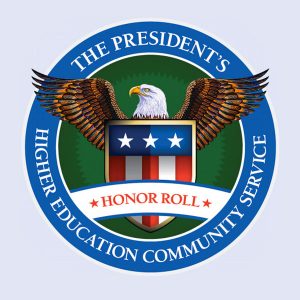 Fordham was recognized in the categories of “General Community Service” and “Education.” The general category acknowledges institutions that are committed to improving the quality of life within the community—particularly for low-income individuals—in any form of service, including education, health, economic opportunity, environmental restoration, and support for veterans and military families. The education category recognizes institutions that work to improve educational outcomes for children and youth in pre-K through undergraduate education.
Fordham was recognized in the categories of “General Community Service” and “Education.” The general category acknowledges institutions that are committed to improving the quality of life within the community—particularly for low-income individuals—in any form of service, including education, health, economic opportunity, environmental restoration, and support for veterans and military families. The education category recognizes institutions that work to improve educational outcomes for children and youth in pre-K through undergraduate education.
Among the public service projects in which Fordham students volunteered were New York City’s HOPE Count to estimate the number of homeless New Yorkers and Urban Plunge, a program in which student volunteers work to combat hunger, promote affordable housing, educate youth, and foster community development in various communities across New York City.
The Dorothy Day Center also connected Fordham’s student groups with at-risk youth in local middle and high schools to provide mentorship, arts and academic workshops, and to offer guidance to high school student clubs.
Universities are chosen based on innovation of service projects, percentage of student participation in service activities, incentives for service, and the breadth of academic service-learning credits. This final criterion is another important component of Fordham education, which includes more than two dozen “service integrated” courses across all disciplines.
Launched in 2006, the President’s Community Service Honor Roll highlights the roles that colleges and universities play in serving local communities and in gearing students toward a life of civic engagement. It is an initiative of the Corporation for National and Community Service, the agency that oversees federal service organization such as AmeriCorps, Senior Corps, and the Social Innovation Fund.
By Joanna Mercuri
]]>Some of the biggest names in film have come to Fordham to talk with students about their experiences—both on-set and off. Director Spike Lee visited theater classes last fall to talk about the movie industry. Academy Award-winning actor and Fordham alumnus Denzel Washington, FCLC ’77, has visited students twice in the past three years, speaking about his craft and how Fordham contributed to his success. And in September 2014, Fordham hosted actor and UNICEF Goodwill ambassador Danny Glover, who screened a film he starred in about a slave uprising in Curacao and stayed for a discussion about the lasting impact of slavery.
James Jennewein, a screenwriter and artist in residence in Fordham’s Department of Communication and Media Studies, frequently invites industry professionals to speak to his classes. He said giving students a chance to connect with leaders in their field yields benefits beyond the content of the speaker’s presentation.
“It puts students in the same room with someone who’s really successful. You see that they’re a regular person like you, and it starts to feel like your dream is a more attainable goal,” Jennewein said.
While Fordham Theatre may attract some of the University’s best-known guest speakers, Fordham students have heard from noted leaders and thinkers in many other fields as well.
Each year, popular writers speak at orientation for incoming students who have read one of their books over the summer. Recent speakers have included National Book Award Winner Alice McDermott; Colum McCann, author of Let the Great World Spin; and novelist Valerie Sayers, FCLC ’73, whose work considers the Catholic experience in America.
Students also hear regularly from well-known physicians and researchers thanks to the Fordham University Science Council. Ronald A. DePinho, M.D., FCRH ’77, president of the University of Texas MD Anderson Cancer Center and a luminary in cancer research, presented a recent fall lecture for the council titled “Conquering Cancer.”
In the philosophy department, Associate Professor William Jaworski, Ph.D., hosts the John C. and Jeanette D. Walton Lecture in Science, Philosophy, and Religion. He said these types of intellectual events help students draw deeper meaning from what they are learning in the classroom.
“It’s hard to see the implications of what you’re learning in biology class on what you just studied in theology. These outstanding scholars who are doing work at the intersection of these topics give students a model. It draws out the implications in ways that they themselves are still learning how to do,” Jaworski said.
Upcoming lectures in the Walton series include “Are We Embodied Spirits or Spiritual Bodies?” (March 11) and “Science and the Sacred” (April 21), featuring distinguished speakers from Central European University and the University of Oxford, respectively.
On-campus lectures also provide a valuable networking resource for Fordham students after graduation. The Fordham at the Forefront series, featuring leading Fordham faculty sharing their expertise on issues of broad interest, are hosted for the alumni community and give students a chance to connect with successful graduates in any number of fields.
Upcoming events include Fordham at the Forefront of Political Behavior with Fordham Law professor Zephyr Teachout, who ran against New York Gov. Andrew Cuomo, FCRH ’79, last fall in the Democratic primary, on April 23 in New York City; and Fordham at the Forefront of Positive Marketing with Professor Dawn Lerman, Ph.D., on Long Island on May 7. Students will be invited to attend both at no charge.
Jake Braithwaite, GSB ’11, assistant director for New York City programming in the Office of Alumni Relations, works on a series of lectures sponsored by the Fordham Wall Street Council to engage alumni in the business community. Events are open to current students as well.
Recent Wall Street Council events have featured Michael Steinhardt, whom Forbes called “the greatest trader in Wall Street history,” and Heidi Miller, former high-level JPMorgan executive who speaks frequently about women in the finance industry. Nemir Kirdar, GBA ’72, CEO of Investcorp, who holds an M.B.A. from Fordham, will speak on June 3.
Braithwaite said that while networking is a valuable component of these events, they also provide the Fordham community a forum to keep flexing and strengthening the intellectual muscles they built in the classroom.
“Fordham students are used to engaging in intellectually rigorous conversations on a daily basis. It’s great that we can offer these opportunities to continue these kind of broad and varied conversations,” he said.
—Jennifer Spencer
]]>The Jesuit Career Center Consortium provides access to job postings and other resources for Fordham students interested in searching for jobs outside the metropolitan area.
This connection to the broader Jesuit community helped Chris Rittenhouse, GSB ’14, secure his job as an associate in account management at Tradition Energy in Stamford, Connecticut.
As he approached graduation, Rittenhouse decided to focus his job search in Boston or elsewhere in New England. Through the reciprocity program, Fordham’s Career Services office helped him connect with Boston College, another Jesuit institution.
Within a month, Rittenhouse secured a job in a field about which he cares deeply. The Jesuit consortium, he said, gave him an edge.
“There was the additional benefit of being a part of a recruitment pool several states away in a city I am particularly keen to live in. That kind of flexibility and, more importantly, mobility, was awesome,” he said.
Kate Dunham, a sophomore in the Gabelli School of Business, is taking advantage of the reciprocity program as she works with the career services office of Loyola University Chicago to find a summer internship in Chicago.
Dunham said she has been deeply impressed by the program and the ease with which the Loyola career services office has answered her questions. She said the experience has helped her realize the value of the broader Jesuit community.
“I think it is such a perfect example of the Jesuit way of being men and women for others. It really doesn’t matter where you are in the country, you have people to help you out,” she said.
Cassie Sklarz and the Fordham Career Services team are constantly working to increase student awareness about the reciprocity program and all of the services Fordham offers. She said she’s pleased to keep supporting students through every step of their search—no matter where it might take them.
“For students applying elsewhere, this program gives a little bit of comfort and makes them feel a little more confident navigating the waters of their job search,” she said.
Students interested in accessing the resources of another Jesuit school should send their resume to Cassie Sklarz, associate director of Fordham Career Services. All requests for reciprocity must be handled through the student’s home school so that the partner school can verify the student’s enrollment or status as a recent graduate.
For more information about the Jesuit Career Center Consortium, contact Cassie Sklarz at 718-817-4358 or [email protected].
—Jennifer Spencer
]]>